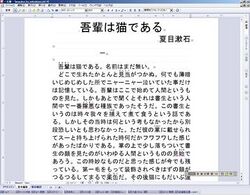Software:Ichitaro
 | |
| Developer(s) | JustSystems |
|---|---|
| Stable release | Ichitaro 2018 (28.0)
/ 9 February 2018 |
| Operating system | Microsoft Windows, Linux |
| Type | Word processor |
| License | Proprietary |
| Website | www |
Ichitaro (一太郎 ichitarō) is a Japanese word processor produced by JustSystems, a Japanese software company. Ichitaro occupies the second share in Japanese word-processing software, behind Microsoft Word. It is one of the main products of the company. Its proprietary file extension is ".JTD". ATOK, an IME developed by JustSystems, is bundled with Ichitaro.
History
The company developed the Japanese word processor JS-WORD for the PC-100 in 1983. In the following year, jX-WORD for the IBM JX was released and in the following year, jX-WORD Taro was released for PC-9801. The same year, Ichitaro was released as its definite successor.
In the DOS era, Ichitaro had a considerable market share along with other rivals such as Matsu by Kanri Kougaku Kenkyujyo. However, as Windows became dominant, the market was largely taken over by Microsoft Word.[1] Some versions of Ichitaro were ported to the Macintosh and to OS/2. In May 2003, the release of a Linux version was announced.
Compact versions, "Ichitaro dash" and "Ichitaro lite" are produced for laptop PCs. As office suite, "Just home" is also available. "Ichitaro smile" is targeted at elementary school students and "Ichitaro jump" at middle and high school students.
On 1 February 2005, sales and production of the software were frozen pending an appeal by the company against a ruling of the Tokyo District Court which states that there is a breach of a patent owned by Matsushita Electric Industrial Co., Ltd.[2]
However, on 30 September 2005, Intellectual Property High Court of Japan, which was newly formed in April 2005, has granted JustSystems’ appeal. Because this judgement became a final decision in October 2005, the original decision sentenced by the Tokyo District Court was overturned.[3]
Versions
| Version | Release Date | Notes |
|---|---|---|
| JS-WORD | October 1983 | For PC-100 |
| jX-WORD | December 1984 | For IBM JX series |
| jX-WORD Taro | February 1985 | For PC-9800 series |
| 1 | 28 August 1985 | MS-DOS |
| 2 | May 1986 | |
| 3 | June 1987 | |
| 4 | April 1989 | |
| 5 | April 1993 | Mac version released in July 1995 |
| 6 | January 1995 | Version 6.3 (August 1995) included internet connectivity |
| 7 | September 1996 | Windows 95 |
| 8 | February 1997 | |
| 9 | September 1998 | All versions from here use .jtd extension |
| 10 | September 1999 | |
| 11 | February 2001 | |
| 12 | February 2002 | |
| 13 | February 2003 | |
| 14 | February 2004 | Ichitaro 2004 |
| 15 | February 2005 | Ichitaro 2005 |
| 16 | February 2006 | Ichitaro 2006 |
| 17 | 9 February 2007 | Ichitaro 2007 |
| 18 | 8 February 2008 | Ichitaro 2008 |
| 19 | 6 February 2009 | Ichitaro 2009. Windows 7 |
| 20 | 5 February 2010 | Ichitaro 2010 |
| 21 | 10 February 2011 | Ichitaro 2011 |
| 22 | 10 February 2012 | Ichitaro 2012 |
| 23 | 8 February 2013 | Ichitaro 2013 Xuan |
| 24 | 7 February 2014 | Ichitaro 2014 Toru |
| 25 | 6 February 2015 | Ichitaro 2015 |
| 26 | 5 February 2016 | Ichitaro 2016 |
| 27 | 3 February 2017 | Ichitaro 2017 |
| 28 | 9 February 2018 | Ichitaro 2018 |
Security
In 2013, Symantec revealed that Ichitaro had the potential to be targeted by trojan horse programs.[4] A gang of Chinese hackers was widely blamed for the incident.[5]
See also
- ATOK
- Office Open XML software
- OpenDocument software
Further reading
- 2005 (Ne) 10040 Appeal Case of Seeking Injunction against Patent Infringement - the Intellectual Property High Court of Japan
References
- ↑ The Yomiuri Shimbun, pp.9 Tokyo morning edition, 8 April 1998.
- ↑ The Yomiuri Shimbun, pp.1 Tokyo morning edition, 2 February 2005.
- ↑ The decision of case 2005 (Ne) 10040, Intellectual Property High Court of Japan - 30 September 2005
- ↑ Symantec: "Yet Another Zero-Day: Japan Hit with Ichitaro Vulnerability", 14 November 2013. Accessed 3 March 2014
- ↑ "New York Times hackers linked to Japan Ichitaro attacks", The Register, 18 November 2013. Accessed 3 March 2014
External links

